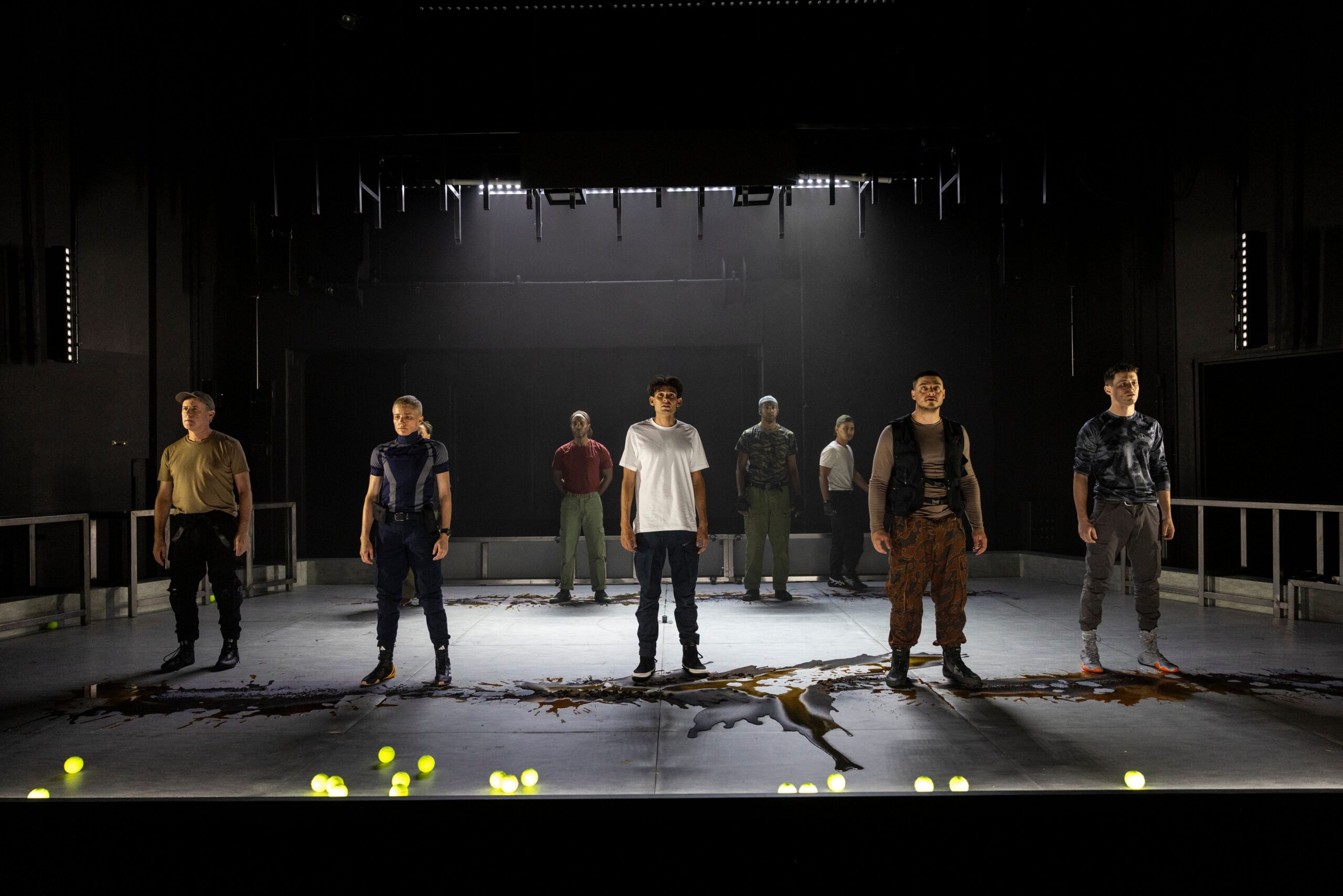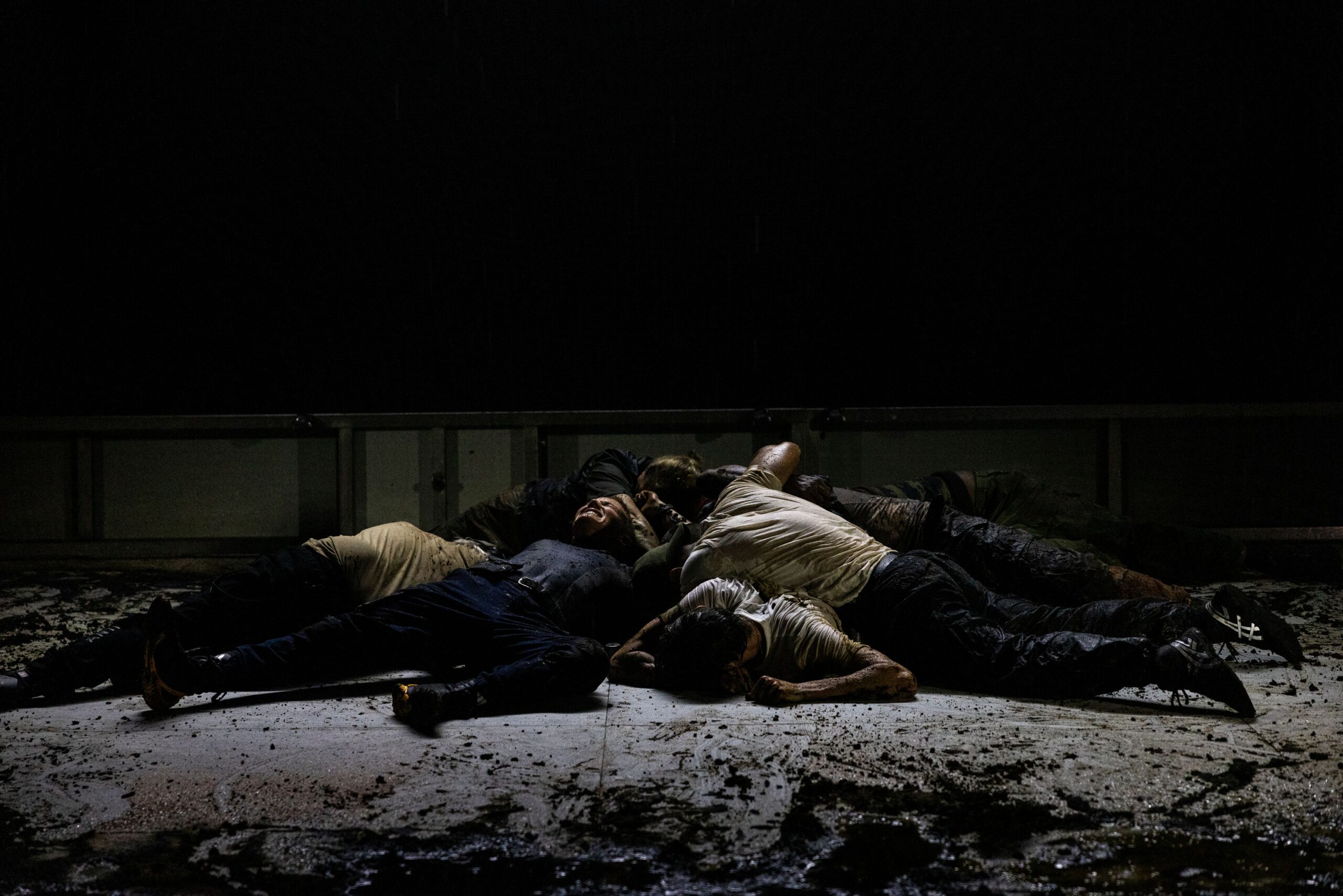”Like all of Shakespeare’s writing, Henry V is so rich that it resonates differently for audiences at different times and under different circumstances. Young men inherit such strong expectations about masculinity and their role as ‘men.’ I’m fascinated by these pressures, and by the humanity at the very core of the play, where people are trying to make choices between the very best and the very worst of what we’re capable of.”
Marion Potts, Director of Henry V
A brand new rendition of Shakespeare’s classic story Henry V is making its way to our IPAC in Wollongong from the 30th of April to the 3rd of May. A story about war and loss, the consequences of turning your back on your conscience and reconciling difficult truths, Henry V questions the humanity present in all of us, bringing a 400-year-old play into a contemporary, 21st-century lens.
I picked actor Ella Prince’s brain for the details. Have a look!
—
SERENA: Can you start by briefly outlining what the play is about and who your character is?
ELLA: The impetus for the play is a question as to whether Henry believes he is the true heir to France and the inciting incident is that he’s supported by Canterbury played by Jo Turner in the factual argument of the rightful lineage of the crown. And, this incites him to wage war on France and thereafter the play follows the defining conflicts. So, the play is a history play and it’s a war play and it’s been brought by Marion Potts into a very contemporary setting. It’s very rooted in the now and is kind of reflective of all those conflicts that we all experience in our lives, either first hand or through the news. So, it’s been brought into that contemporary realm of society.
And, I play Exeter who is essentially Henry’s right hand man and his advisor. In the play itself, he’s older than Henry but in our telling I’m a contemporary to him, age wise. And, so we’re physically present in that war and as we fight similarly.

SERENA: How does the war in the play relate to our contemporary political environment, and how can audiences relate to it?
ELLA: So, I think that at this time in particular, we’re all really touched by that – sort of, politically and personally – in terms of a global conscience and how we witness the war in a different way than how we did 50 years ago. I mean, it’s so close to us, it’s within our own bedroom. Marion as a director has her own take on that, and in the broader sense, we’re all embodying this sense of ‘there’s no winner in war, only losses and conflicts.’ It’s an embodiment of the frustrations around conflicts and the horrors of war and the losses that are suffered. I think as a player in the ensemble, for me personally, it is essential knowing that these conflicts are taking place all over the world at this time and that the suffering is so immense. Even though I don’t have that moving experience, it’s just about honouring that on stage as best I can. Emotionally investing as best I can, knowing that most people who are sitting in the audience are touched by these within their own spheres. They might have relatives currently in conflict zones, they might have suffered relative losses. All these things – just bearing the responsibility of how close that experience is for so many people right now and trying to honour that in the telling of the story.
SERENA: We’re so desensitised by social media that I think it’s important for us to go out and watch these kinds of themes for ourselves. We have this sort of veil between us and our screens for protection that keeps us from connecting to these stories. How does this reflect in the space?
ELLA: Well, it’s amazing if the theatre can open your eyes to anything but it’s certainly really nice to share space with people. It’s beautiful for us to have that rehearsal period to bring ourselves and our stories and our thoughts into these themes and this work in particular and really bring it apart in rehearsal and within the play. But more so, in performance to actually share that space of connection is really huge I think. It’s a really magical thing to find a space – even if it’s not educating someone – it’s just a space for someone to breathe and connect to others watching the play as well. And, everyone will sort of read into the play differently because of those contemporary elements. There’s a lot up for interpretation, and especially since Marion has really abstracted the physicality of war. So, we don’t have weapons on stage, we just have our bodies. So, that also inspires an element of imagination for the audience. There’s physical contact and there’s imagery that’s specific to war but it’s shaped in a way that allows you to put what you see into the play as well.

SERENA: I’d imagine that could be a hard task behind the scenes. Have you had any challenges in rehearsals?
ELLA: I’d actually probably flip it and say that, more than a challenge, it’s been a privilege. I’m very lucky with some of the texts that I’ve been assigned, much of which is Exeter’s already but because of the editing of the text, the neo ensemble of 10 actors on stage – we have 2 swings who swing in each night – so, there’s 11 ensemble members, but 10 on stage. So, obviously there’s an act of doubling and then there’s also an editing that pushes things together. But, the text that I’m allowed to speak to and the journey that my character goes on in particular – they’re [Exeter] very boisterous and confident and assertive and bold in the first instance and very proud and brave. But, Exeter is very much changed by war, as anyone would be, and for me that’s the privilege: of playing that change and that journey for Exeter. They witness the death of many of their comrades and then have to recount to Henry that he has in fact lost his best friend, Westmoreland. So, that kind of calls my own experience with grief which I have, unfortunately, had quite a lot of people that I love that have died and I really feel that I’m greatly honoured to stand on stage and hopefully bring some truth to that.
SERENA: It’s a pretty big theme to be working with, one that is universally understood. Is there anything that you would like for the audience to leave with?
ELLA: Maybe a celebration of connection and of the humanity present in all these things, and maybe particularly because we’re privy to so much with our phones there’s a brutality and a horror to what we can see but there’s a dissociation as well that takes place which is for some protection. We kind of are always oscillating between being able to function and empathising, and where to live in between. And so, I think, if you can take anything from it is that it’s performed with love and with care and there’s a beautiful ensemble and team behind the scenes every night. And, in my experience, a generosity with the cast and crew in this project, so hopefully an audience can feel a bit of that. And, if they’re moved, wonderful, if they laugh, wonderful, because it is also funny. But the best thing about theatre is connection, right? It’s about being in the same space together and sharing stories and feeling like you’re breathing the same air as other people.
SERENA: Marion talks about the masculinity and gender roles in the play, would you like to expand on this idea for us?
ELLA: Again, I feel very lucky to have been cast in this ensemble and I can’t really speak to anyone else’s masculinity, but for myself I really enjoy that the play and the physicality of the play allows me to be very grounded. It’s an athletic play, it’s a very moving piece and it requires a lot of physical skill amongst the whole cast. I reflect on it quite a lot on how beautiful it is, particularly for me as a non-binary body just to embrace those masculine elements, but as well just to feel at ease in my body. So, I’m not really attempting to play anything, I’m just allowed to be as I am … I don’t know how people perceive it, but for me it feels extremely comfortable and so I feel really grateful to be cast. You know, Exeter is written as a man, but I’m not trying to play gender, I’m just trying to play a kind of truth but I’m very grateful that the physicality is so connected, and so that is something I really enjoy.
SERENA: That’s great to hear that you’re comfortable with the character. What was your creative process behind connecting with the character fully and understanding how Exeter thinks and feels? Was it instant or did it take some time?
ELLA: Every actor’s process is so different but for me tempo is important. Tempo of body, tempo of breath and I think that the assuredness of Exeter and the confidence and the stoicism and the firmness I think has informed that kind of inner life, inner tempo, inner tonality. So, there’s a lot for me that comes from – as well from the language – but certainly how they kind of play dynamically in a scene. There’s lots of things that help me, you know, the costume that I wear and that ritual of costume is very helpful to become, and also to de-role from that character and when you remove it and have a shower. Those sort of simple things, and how you travel home. But, I think in some strange ways I think that Exeter is more ‘me’ than many other characters I’ve played. Not necessarily morally more me, we don’t entirely align in those ways but in terms of – there’s something that is happening in me and in playing Exeter that I feel very close to, and I really appreciate the contradictions within the character and I also appreciate – and maybe that’s the challenge for me, when you asked that earlier. About playing someone that feels quite peaceful to fall into, and then how you negotiate the choices they make and the thoughts that they have and the words that they speak.
SERENA: Would you like to add anything else?
ELLA: I’ve never performed in Wollongong before and it’s been a long time since Bell has travelled there so I think we’re all really excited to be there and feel your theatre space and to connect and get to know your audience. And particularly when we’re only doing a few venues – we’re only doing Sydney, Canberra, Melbourne and Wollongong.
—
Bell Shakespeare is a theatre company that takes the classic Shakespearean tales to schools and theatres all over Australia. Starting off in a circus tent in Sydney in the 90s, Bell Shakespeare has grown, alongside their goal, to reshape audience’s views on Shakespeare’s works through their performances.
Henry V will be performed at the IPAC from the 30th of April to the 3rd of May.
Check out this link for more information on times and tickets: https://merrigong.com.au/shows/henry-5/
Photos by Brett Boardman




